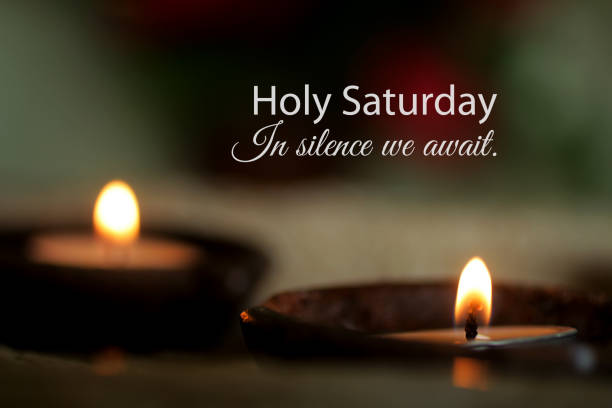In many traditions of the Church, today marks Holy Saturday – sometimes known as Easter Vigil. In all four gospel accounts this day is mentioned as the Sabbath between the Crucifixion and the Resurrection. After Christ’s body is removed from the Cross Joseph of Arimathea is given permission by Pilate to bury him. In a few of the gospel accounts the women (Mary Magdalene and the “other” Mary) start preparing the spices and oils which will be used along with linen cloths to wrap his body. In the John account (John 19) it is actually Nicodemus who does this. But before the preparations are completed the Sabbath begins. And so the ritual is not completed.
I think it’s significant that there is this moment between two of the most profound aspects of our Christian faith. We know from the Apostle’s Creed that this is the day Jesus descended into Sheol. Remember all of the disciples thought Christ’s death was the end of it. Most of them had abandoned Jesus in his greatest hour of need. There was no vigil for them that Sabbath night. They gathered to grieve, to weep, to mourn the death of their dream. Not one of them seemed to remember what Jesus had said to them about his death. In the Mark account he predicts his death in three passages (Mark 8:31-33, 9:30-32, and 10:32-34). In those same passages he predicts his resurrection.
In many ways, Holy Saturday is a time of suspension. Hanging between the Crucifixion and the Resurrection it is neither fraught with grief or fraught with hope. It’s an in-between day. But I think we’ve all had our holy Saturdays – those seasons in our lives where we feel in limbo – perhaps even between death and life. A loss, a death, a marriage, a miscarriage, a job, a parent… Have you ever thought about those days between the Cross and the Resurrection? Why. Did God need that? Did we need that? For the disciples how ashamed most of them must have been. To abandon Christ after all they had experienced with him. And how confusing it would have been – to walk with the King into Jerusalem less than a week ago to being stunned by what happened at Golgotha.
Our own holy Saturdays can be a time when we cry out to God. I think we are given permission to bring to Him the tension of those struggles we have. It could be a time to sit in the many psalms of lament in the Scriptures (Psalms 4, 35, 79, 94, and so many more). The cry of our heart might simply be “How Long, O Lord”. I recently did a study of that phrase and was very surprised at how often it came up. Psalm 13:1 – “How long, O LORD? Will you forget me forever? How long will you hide your face from me? God invites us to bring to him all that is in our heart – even our doubts or fears or pain or struggles.
It is also a day of Sabbath rest – even more than a time – it’s a place of rest, where we might suspend our own struggles to simply find rest in God. Where we might remind our hearts that God is faithful. “But I trust in you, O Lord; I say you are my God” (Psalm 31:14). Most of the laments in the Psalms begin with sheer honesty – and yet end with trust.
As the preacher said – It’s Friday but Sunday’s coming! Our Christian Hope is established on Friday and fulfilled on Sunday! And in the meantime – there’s grace to rest, to be in God’s presence, to abide in faith. We all need Holy Saturdays – because in the testing of our faith we are told by Peter – “after you have suffered a little while, the God of all grace who has called you to his eternal glory in Christ, will himself restore, confirm, strengthen, and establish you. To him be the dominion forever and ever. Amen!” (1 Peter 5:10-11).

